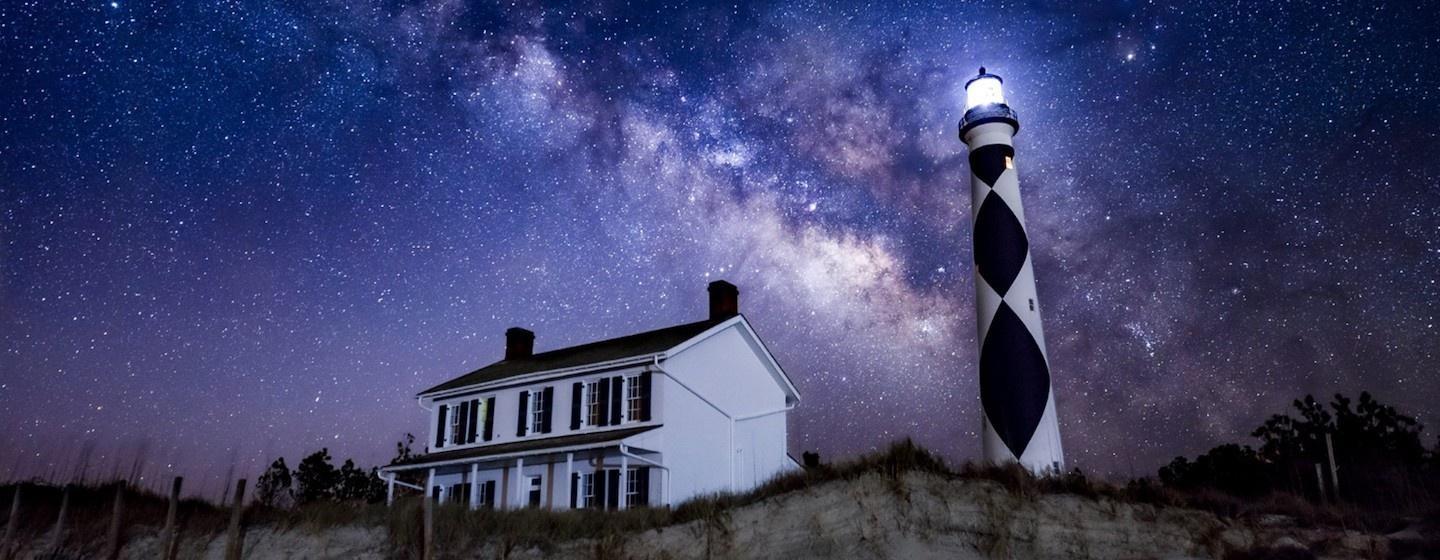Cape Lookout National Seashore Becomes a Certified Dark Sky Place


You don’t need to travel across the country to Hollywood to see the stars.
It turns out you’ll see more stars than you can imagine by visiting Cape Lookout National Seashore on the North Carolina coast.
Provided, of course, that it’s a clear night.
Cape Lookout National Seashore has been certified by the International Dark Sky Association as a Dark Sky Place, which “recognizes the exceptional quality of the night skies of the park and the opportunities it provides for astronomy-based experiences for park visitors.”
It’s the first National Park Service unit on the Atlantic coast to receive the recognition. The application has been in the works for two years.
Cape Lookout National Seashore is a string of narrow barrier islands totaling 56 miles and 29,000 acres between Ocracoke Inlet at the seashore’s northeast boundary and Beaufort Inlet at its southwest.
“We are proud to include Cape Lookout National Seashore into our International Dark Sky Places Program,” said Ashley Wilson, Director of Conservation with the International Dark Sky Association. “The unit understands and is fully committed to dark-sky efforts, and visibly demonstrates the balance between using light efficiently and coexisting with the natural, nocturnal environment with their lighting decisions.”
The certification required an evaluation of the light fixtures within the park and surrounding area. In some cases, that meant light fixtures were retrofitted or replaced altogether to meet dark-sky-friendly lighting requirements. The process also required a plan to protect the dark-sky status in the future.
“This certification is both an honor for our community and recognition of the unique values that make this park a national treasure,” said Jeff West, superintendent of Cape Lookout National Seashore. “Embarking on this project helped me remember the wonder and amazement I felt gazing into the night sky as a child. The possibilities I imagined then are still there, dwarfing life’s daily demands when put in perspective. Maybe we all need a little star gazing right now.”
The certification process also required the support of community partners. It's probably not surprising that the Crystal Coast Stargazers Club joined the application process. The group presents astronomy programs at the park for the public throughout the year.
“We are thrilled with the Dark Sky recognition and our participation in the application process was truly a labor of love, said Vermadel Nienstedt, club coordinator with the Crystal Coast Stargazers. “Our beautiful night skies in Carteret County will now be known now only throughout the U.S. but also internationally. We look forward to welcoming visitors will now come seeking the night view that we are so blessed with.”
“The International Dark Skies project has been a learning process for all of us and we are very honored to be part of bringing this new appreciation for our natural world to locals, visitors and students,” said Karen Amspacher, executive director of the Core Sound Waterfowl Museum and Heritage Center, and also one of the partners in the application.
Cape Lookout National Seashore joins more than 190 places around the world that are dark sky certified.
The International Dark Sky Places Program was founded in 2001 as a voluntary program to encourage communities, parks, and protected areas around the world to preserve and protect dark sites through effective lighting policies, environmentally responsible outdoor lighting, and public education.
The group says it promotes the wise use of artificial light because “when used indiscriminately, artificial light can disrupt ecosystems, impact human health, waste money and energy, contribute to climate change and block our view and connection to the universe”